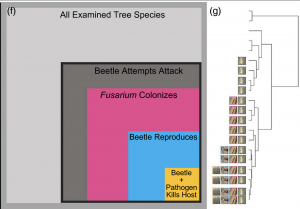
The phylogenetic signal of transmissibility (competence) and attack severity among hosts of generalist pests is poorly understood. In this study, we examined the phylogenetic effects on hosts differentially affected by an emergent generalist beetle–pathogen complex in California and South Africa. Host types (non-competent, competent and killed-competent) are based on nested types of outcomes of interactions between host plants, the beetles and the fungal pathogens. Phylogenetic dispersion analysis of each host type revealed that the phylogenetic preferences of beetle attack and fungal growth were a nonrandom subset of all available tree and shrub species. Competent hosts were phylogenetically narrower by 62 Myr than the set of all potential hosts, and those with devastating impacts were the most constrained by 107 Myr. Our results show a strong phylogenetic signal in the relative effects of a generalist pest–pathogen complex on host species, demonstrating that the strength of multi-host pest impacts in plants can be predicted by host evolutionary relationships. This study presents a unifying theoretical approach to identifying likely disease outcomes across multiple host-pest combinations.
Lynch, S. C., A. Eskalen, and G. S. Gilbert. 2020. Host evolutionary relationships explain tree mortality caused by a generalist pest-pathogen complex. Evolutionary Applications https://doi.org/10.1111/eva.13182.